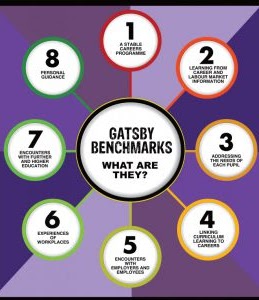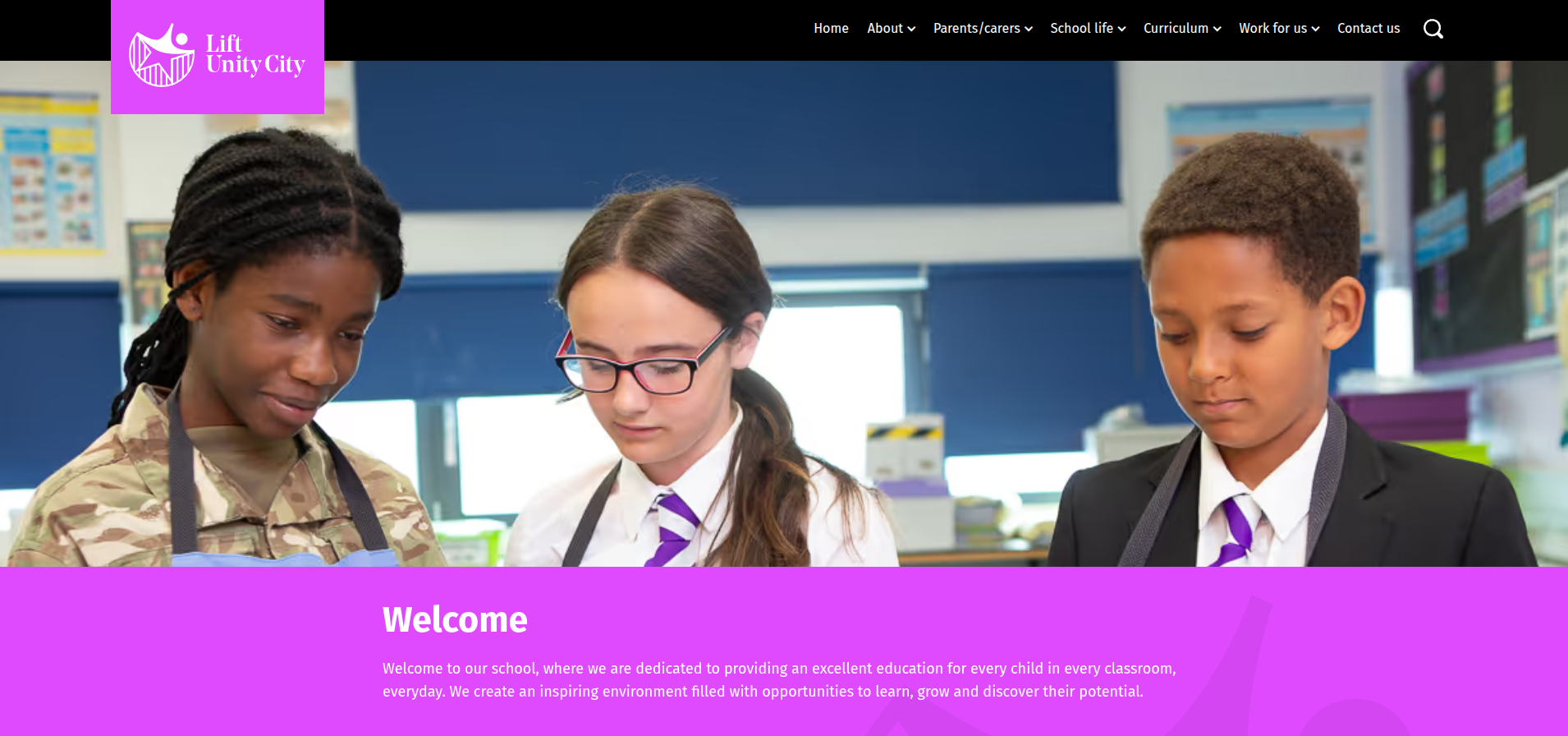At Lift Unity City, we are committed to delivering Careers Information, Advice and Guidance (CIAG) across the whole curriculum and across all year groups to ensure that all year groups feel empowered and informed with the knowledge and skills to thrive in the outside world and in their further education.
Our Career’s programme runs from Year 7 to Year 11 alongside our PDC tutor programme to ensure that all students get a wide variety of opportunities and chances to experience life after the academy. This includes: 1:1 careers interviews for our Year 11 and Year 10 students, Year 10 work experience, college visits for our Year 10 students as a whole cohort and aspirational meetings with employers and training providers throughout the academic year.
We provide the opportunity to participate in annual and also one-off experience in close collaboration with Lift Schools, our local colleges, universities, training providers as well as the Careers and Enterprise Company.
Careers Programme
All year groups follow a bespoke curriculum for Careers during different sessions throughout each week.
Provider Access Policy
This policy statement sets out the school’s arrangements for managing the access of providers to the school for the purpose of giving them information about the provider’s education or training offer. This complies with the school’s legal obligations under Section 42B of the Education Act 1997.
Post-16 Information for Parents/Carers and Students
It is a government expectation that all young people remain in education, training or employment until the age of 18. Preparing for Post-16 courses and opportunities can be an overwhelming experience for both students, parents and guardians. There are a lot of terms and qualifications types that you may have not come across before and that can be confusing. Hopefully, the following guide will help to answer some of those questions. If you need any further information, please do not hesitate to contact our careers leaders, who will be able to answer your questions.
T levels
T Levels are new technical study programmes that sit alongside apprenticeships and A levels within a reformed skills training system. The introduction of T levels aims to streamline technical education and focuses on developing skills that sit within 15 industry routes. T levels will be level 3 technical study programmes, based on employer-designed standards and content, which will prepare students for highly skilled jobs and enable them to adapt to meet the skills needs of the future. Students achieving T levels will be able to progress to the highest levels of skilled employment or technical education and training at levels 4, 5 and 6. Progression options will include higher and degree level apprenticeships or higher technical education, including technical degrees. Apprenticeships and T levels are on the same set of standards designed by employers and others but there will be a difference in the overall content of each programme to reflect that apprenticeships are mainly delivered in the workplace, and T levels will mainly be delivered in the classroom. Students achieving a T level will have the numeracy, literacy, digital skills and wider transferable skills, attitudes and behaviours needed to succeed in occupations relevant to their chosen route and the wider workplace of the future.
Apprenticeships – Level 2, 3 or 4 Qualifications
Apprenticeships allow students to earn while they learn. They combine on-the-job experience with college based study. Apprenticeships are Government-funded programmes.
However, students need to approach work places to arrange apprenticeships because many apprenticeships are not advertised until June / July. Students also need to ensure that the employer has, or is willing to establish, a formal relationship with a college for the college based study element of the Apprenticeship. Apprenticeships can be Level 2, 3 or 4. The entry requirements vary considerably depending of the Level of the qualifications.
Functional Skills
These courses cover Maths, English and ICT (computer skills). Students are often instructed by colleges to complete Functional Skills in addition to their chosen courses if they haven’t gained the relevant GCSE pass grades 9-4.
Vocational Courses
Vocational qualifications offer a more practical approach to learning that relates to specific jobs or industries e.g. childcare, business, sport. Unlike A Levels, there are different “Levels” of vocational qualifications.
- Entry Level – Up to 1 Year: There are often no formal entry requirements for these courses, which are designed to provide students with essential life and study skills. Entry Level programmes can help prepare students to begin Level 1 Courses.
- Level 1 – 1 Year: Level 1 qualifications are equivalent to GCSE 4-1 grades. Students will usually need to have gained 3 and 4 grades in their GCSEs to study a Level 1 programme. Successful completion of Level 1 courses can allow students to progress to Level 2 courses.
- Level 2 – 1 Year: Level 2 qualifications are equivalent to GCSE 9-5 grades. Students will usually be expected to have achieved at least four GCSEs at grade D or above to enroll on one of these programmes, although requirements can vary according to which Post-16 Provider students wish to attend. Successful completion of Level 2 courses can allow students to progress to Level 3 courses.
- Level 3 – 2 Years: Level 3 vocational qualifications are equivalent to three ‘A’ Levels so students will usually need to have achieved at least five GCSE passes at grade 5 or above to enroll on these programmes. However, requirements can vary according to which Post-16 Provider students wish to attend. Upon successful completion of a Level 3 qualification students will be in a position to go into the workplace or apply for university courses, which are Level 4 and above.
A Levels – Level 3 Qualifications
A Level qualifications are more academic in nature and focus on traditional study skills. They usually take two years to complete.
Entry requirements vary according to which Post-16 Provider students wish to apply for and which subjects they wish to study. Typically, students will be expected to have achieved 5 9-4 Grades including English and Maths. Many courses will ask students to have achieved a Grade 5 or above in the subject they wish to study.
From 2015, the Government introduced changes to ‘A’ Level subjects. These changes mean that the new reformed ‘A’ Levels will be ‘linear’, with all assessment undertaken at the end of two years of study.
The subjects that will be linear from 2015 are English Language, English Literature, English Language & Literature, the Sciences, History, Psychology, Art & Design, Business Studies and Computing.
The remaining subjects will continue as before, with students gaining half their marks assessed through the AS qualification in the first year of study. AS Levels are equivalent to half an A Level. Some students gain an AS qualification and then do not complete the second year to achieve an A Level.
Some Post-16 providers will ask students to select 4 A Level subjects. Some will ask students to select up to 5 A Level subjects.
Upon successful completion of a Level 3 qualification students will be in a position to go into the workplace or apply for University (Level 4) courses.
Our Careers Team
Miss B Whitfield (Associate Assistant Principal): responsible for strategic leadership of the careers programme.
Miss L Ashenden (Careers Lead and Advisor): The role of the careers lead and advisor is to plan and implement a strategy for developing a careers programme for the Academy that meets benchmarks good practice and prepares young people for the choices and transitions in education, training and employment. To provide professional career guidance services, including personal guidance interviews, in order to improve pupils’ skills, knowledge and understanding for career planning and management.











